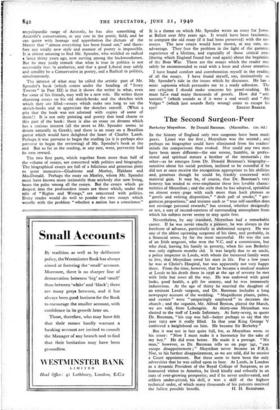The Second Surgeon-Peer
Berkeley Moynihan. By Donald Bateman. (Macmillan. 12s. 6d.)
IN the history of England only two surgeons have been made peers. Lister was the first ; Moynihan was the second ; and perhaps no biographer could have eliminated from his readers' minds the comparisons thus evoked. Nor could any two men have been more different—the one serene, humble, in profes- sional and spiritual stature a brother of the immortals ; the other—as he emerges from Dr. Donald Bateman's biography— sensitive about his social position, inclined to be resentful if he did not at once receive the recognition appropriate to his abilities and, generous though he could be, frankly concerned with material gain. It may be, of course, that Dr. Bateman's very honesty has tended to over-emphasise these less lovable charac- teristics of Moynihan ; and the style that he has adopted, sprinkled on almost every 'page with such more than hack phrases as " gentle and retiring disposition," " drab pall of smoke," " gar- gantuan proportions," and truisms such as " true self-sacrifice does not envisage personal rewards," has created, whether designedly or not, a sort of second-rateness of surrounding atmosphere from which his subject never seems to step quite free.
Nevertheless, by any standard, Moynihan had a remarkable career. If he was never exactly a piOneer, he was always in the forefront of advance, particularly in abdominal surgery. He was one of the ablest operating surgeons of his time, and probably, in a financial sense, by far the most successful. He was the son of an Irish sergeant, who won the V.C. and a commission, but who died, leaving his family in poverty, when his son Berkeley was only eighteen months old. It was largely due to an uncle, a police inspector in Leeds, with whom the bereaved family went to live, that Moynihan owed his start in life. For a few years he was at Christ's Hospital, but was apparently not very happy there. From the time, however, that he became a medical student at Leeds to his death there in 1936 at the age of seventy he met with little but roses all the way. He was endowed with good looks, good health, a gift for oratory, and he was immensely industrious. At the age of thirty he married the daughter of an eminent Leeds surgeon, and Dr. Bateman includes a long newspaper account of the wedding. " Magnificent plants, palms, and exotics " were " unsparingly employed " to decorate the church ; and the organist, Mr. Alfred Benton, played the March, we are told, from Lohengrin. At thirty-one Moynihan was elected to the staff of Leeds Infirmary. At forty-seven, to quote Dr. Bateman, " his cup was full—better perhaps to say that the year 1912 saw it really filled. In that year King George V conferred a knighthood on him. He became Sir Berkeley " But it was not in fact quite full, for, as Moynihan wrote to his sister : "Now I must make it a baronetcy for the sake of my boy." He did even better. He made it a peerage. "No man," however, as Dr. Bateman tells us on page 341, " can escape disappointment ; " Moynihan never became an F.R.S. Nor, to his further disappointment, as we are told, did he receive a Court appointment. But these seem to have been the only adversities that he was called upon to bear. At Leeds, in London as a dynamic President of the Royal College of Surgeons, as an honoured visitor to America, he lived kindly and robustly in an aura of ever-growing prosperity; and if he never under-rated, and seldom under-priced, his skill, it was a skill of the highest technical order, of which many thousands of his patients received






























 Previous page
Previous page